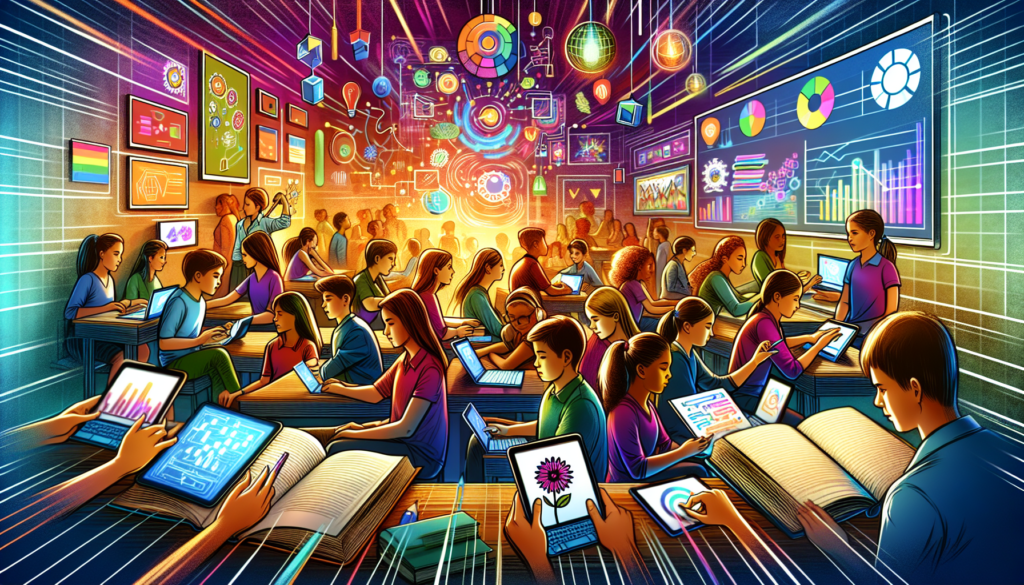Curious about how EdTech solutions can transform education? Discover the top tools that make learning engaging and personalized, while also easing administrative burdens for educators. This article outlines the best EdTech solutions to enhance the educational experience for both students and teachers.
Key Takeaways
- EdTech solutions enhance student engagement through interactive materials and personalized learning experiences, making education more effective and inclusive.
- Effective EdTech features include interactive learning materials, seamless communication tools, and robust data analytics that improve teaching strategies and student performance.
- Successful implementation of EdTech requires assessing educational needs, providing teacher training, and ensuring data security to create a supportive learning environment.
Benefits of EdTech Solutions
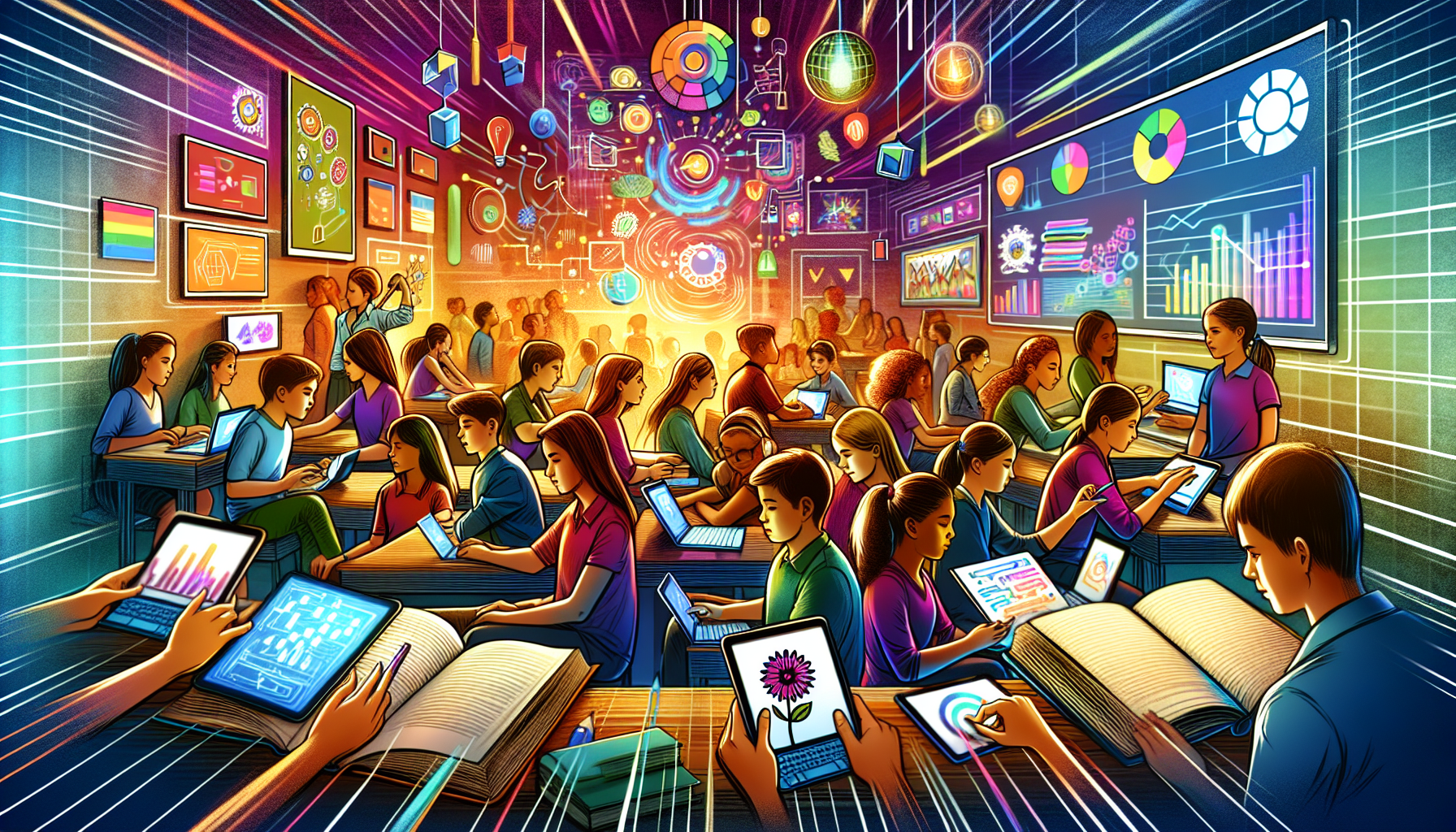
EdTech solutions are revolutionizing the educational landscape by making learning more engaging and accessible. From enhancing student engagement to providing personalized learning experiences and streamlining administrative tasks, the benefits of educational technology are vast and impactful.
One of the primary advantages of EdTech is its ability to improve student engagement. Incorporating interactive and immersive learning experiences motivates students and involves them more in their education. EdTech tools also offer personalized learning experiences tailored to individual student needs, making education more inclusive and effective.
Integrating EdTech solutions can significantly reduce the administrative burden on educators, enabling them to focus more on teaching instead of paperwork.
Improved Student Engagement
Using EdTech tools in the classroom can significantly enhance student engagement. Interactive materials like engaging video content, multimedia, and gamification elements make learning more enjoyable and stimulating. Gamification, which includes rewards and challenges, has been shown to boost student motivation and participation by introducing competitive elements into the learning process.
Moreover, augmented reality (AR) creates a stimulating atmosphere that keeps students immersed in their learning environment. AI in K-12 education has led to significant improvements in student satisfaction and performance. These technologies not only make learning more engaging but also foster a deeper understanding of the material.
Personalized Learning Experiences
A standout benefit of EdTech is its ability to provide personalized learning experiences. Data analytics can tailor educational content to meet the unique needs of each student, ensuring no learner is left behind. AI-driven tools, especially in online K-12 education, enhance personalized learning by offering adaptive learning systems that adjust content based on student performance.
Adaptive learning technologies cater to individual needs, automate tasks, and predict performance, providing a highly customized learning path for each student. The use of Learning Management Systems (LMS) further supports this by allowing for customized learning paths tailored to individual student needs.
Streamlined Administrative Tasks
EdTech solutions can streamline administrative tasks in educational institutions, making overall management more efficient. Digital school management systems automate routine tasks, enabling educators to focus on teaching responsibilities rather than paperwork.
Modern educational software reduces teacher workload by automating secondary processes and managing documentation electronically instead of on paper. This not only enhances organizational efficiency but also allows schools to operate more smoothly and effectively.
Key Features of Effective EdTech Solutions
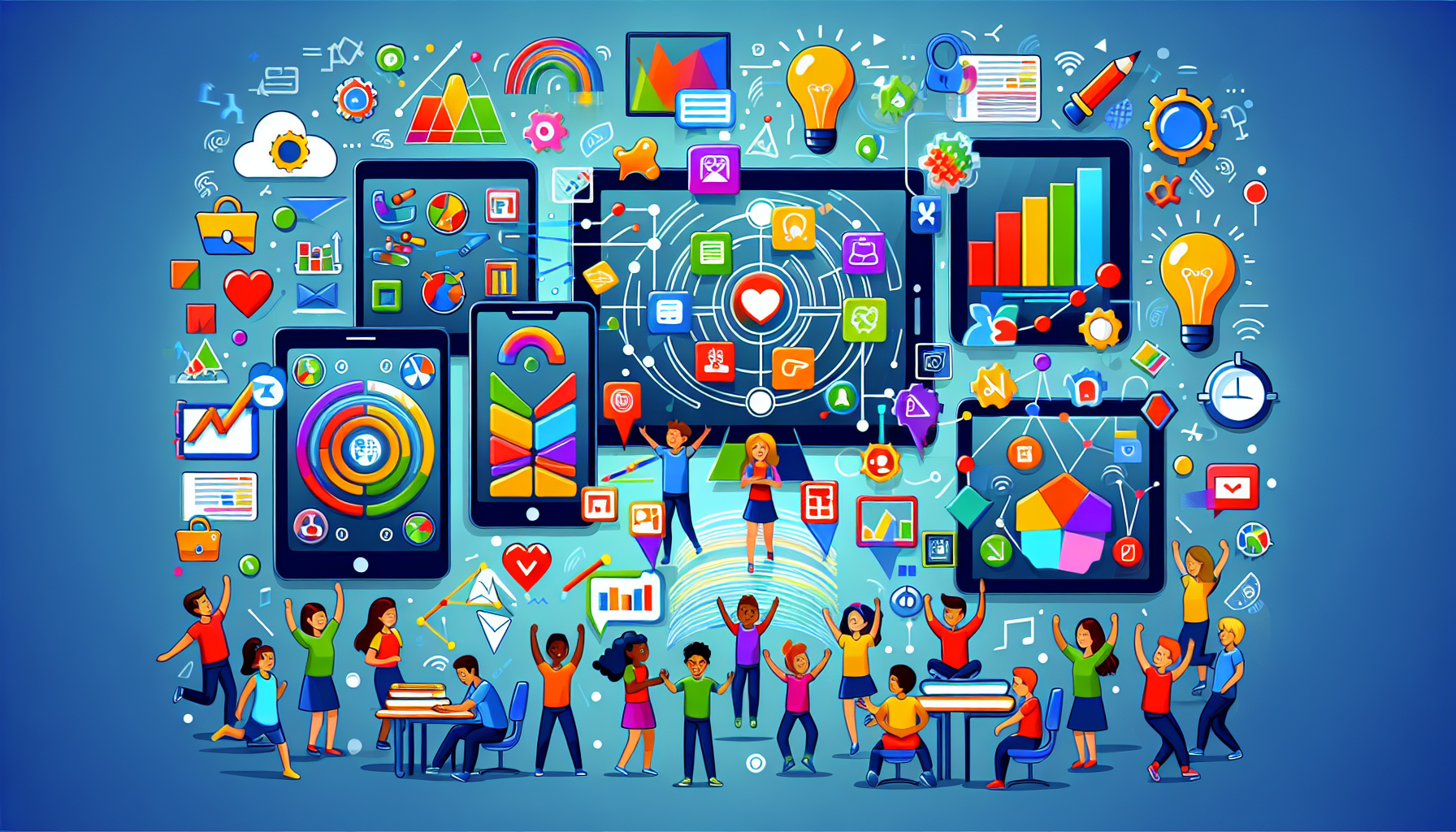
Effective EdTech solutions feature essential characteristics that ensure they meet the needs of both educators and students. These features include interactive learning materials, seamless communication tools, and data analytics for student performance. Each of these elements plays a critical role in creating a comprehensive and effective educational technology ecosystem.
User-friendly, customizable dashboards are crucial for enhancing user satisfaction and adoption rates. Generating excitement and buy-in from stakeholders through targeted communication is crucial for the successful integration of these tools.
Interactive Learning Materials
Interactive learning materials are a cornerstone of modern education, making the learning process both engaging and effective. These tools cater to various learning styles and reinforce concepts better than traditional methods. Types of interactive learning materials include games, quizzes, and simulations, all designed to captivate students’ attention and enhance their understanding.
VR and AR in education enrich the learning experience by providing immersive environments where students can explore complex concepts through virtual field trips and detailed simulations. Technology-facilitated collaborative projects promote teamwork and communication skills among students, enhancing their overall educational experience.
Seamless Communication Tools
Effective communication tools are vital in EdTech because they facilitate interactions among students, teachers, and parents. Built-in messaging systems in school management platforms streamline communication and ensure all stakeholders are kept in the loop. These tools are crucial for monitoring student progress in real-time and tailoring lessons to individual learning styles.
AI enhances adaptive learning systems by providing real-time insights into student progress and offering timely feedback. Implementing a Learning Management System (LMS) can significantly improve coordination between faculty and students, fostering a cohesive learning environment.
Data Analytics for Student Performance
Data analytics is a powerful tool in education, providing insights that can enhance teaching strategies and student performance. Analyzing trends and patterns allows educators to develop more effective teaching methods and identify areas for improvement. Big data analytics ensure timely and effective educational interventions, helping students who are struggling academically.
Machine learning and AI analyze individual and group performance on various topics, facilitating targeted support and personalized learning experiences. AI-driven analytics make it possible to track student performance in real-time, enabling educators to provide timely and effective support.
Popular Types of EdTech Solutions
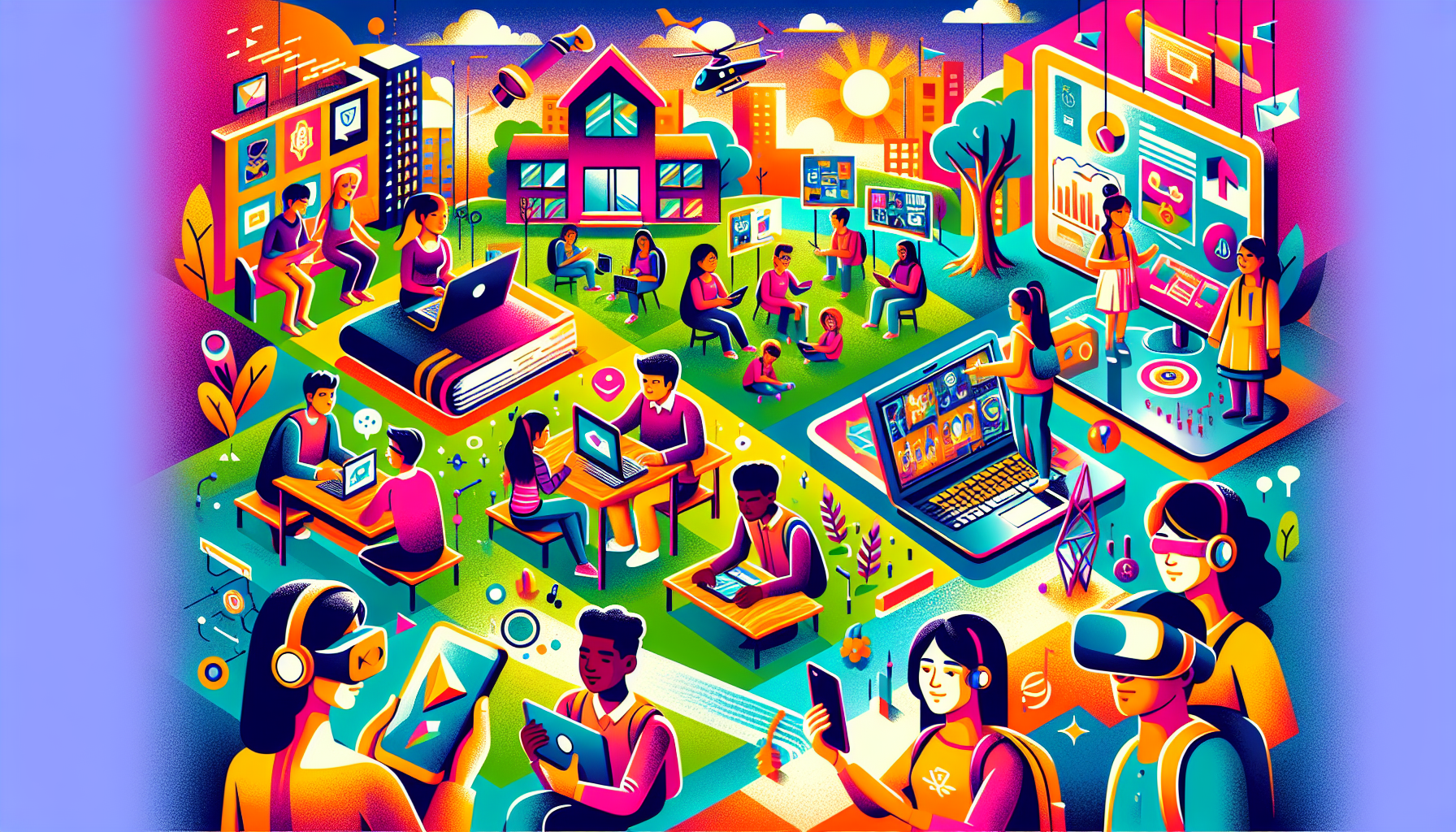
EdTech offers a variety of solutions designed to enhance the educational experience. Among the most popular are:
- Learning Management Systems (LMS)
- Virtual Reality (VR)
- Augmented Reality (AR)
- Mobile learning apps
Each of these tools offers unique benefits and caters to different aspects of education.
These technologies facilitate easy access to a wealth of online resources and learning materials, creating immersive learning experiences that enhance students’ understanding of various subjects.
The education technology sector is poised for extensive growth, driven by innovations in learning methods and technologies.
Learning Management Systems (LMS)
Learning Management Systems (LMS) play a crucial role in managing educational content. They are also key for facilitating online learning. These platforms provide centralized management for courses, track student progress, and facilitate communication between students and educators. Centralized management of learning-related data and materials ensures efficient monitoring of educational processes.
Proper content cataloging in LMS benefits students by making navigation easier and access to resources simpler, enhancing the overall learning experience. LMS platforms are particularly beneficial for adult learners and educational institutes, providing a structured and accessible way to manage learning materials.
Virtual Reality (VR) and Augmented Reality (AR)
Virtual Reality (VR) and Augmented Reality (AR) technologies enable students to explore environments and concepts that are otherwise inaccessible, facilitating unique learning experiences. These technologies provide immersive learning experiences that significantly enhance understanding and retention of information.
Virtual tours of ancient civilizations can immerse students in history, while simulations and practical training offer hands-on experiences crucial for experiential learning. VR and AR in education demonstrate how new technologies can transform traditional learning methods.
Mobile Learning Apps
Mobile learning apps provide learners with on-the-go access to educational content, catering to their need for flexibility. These apps are particularly beneficial for adult learners and professionals who need to learn at their own pace and schedule.
Augmented reality in mobile learning apps further enriches the learning experience by providing interactive and immersive content. Cloud services ensure that learners can access their materials from anywhere, making education more accessible and convenient.
Implementing EdTech Solutions in Schools
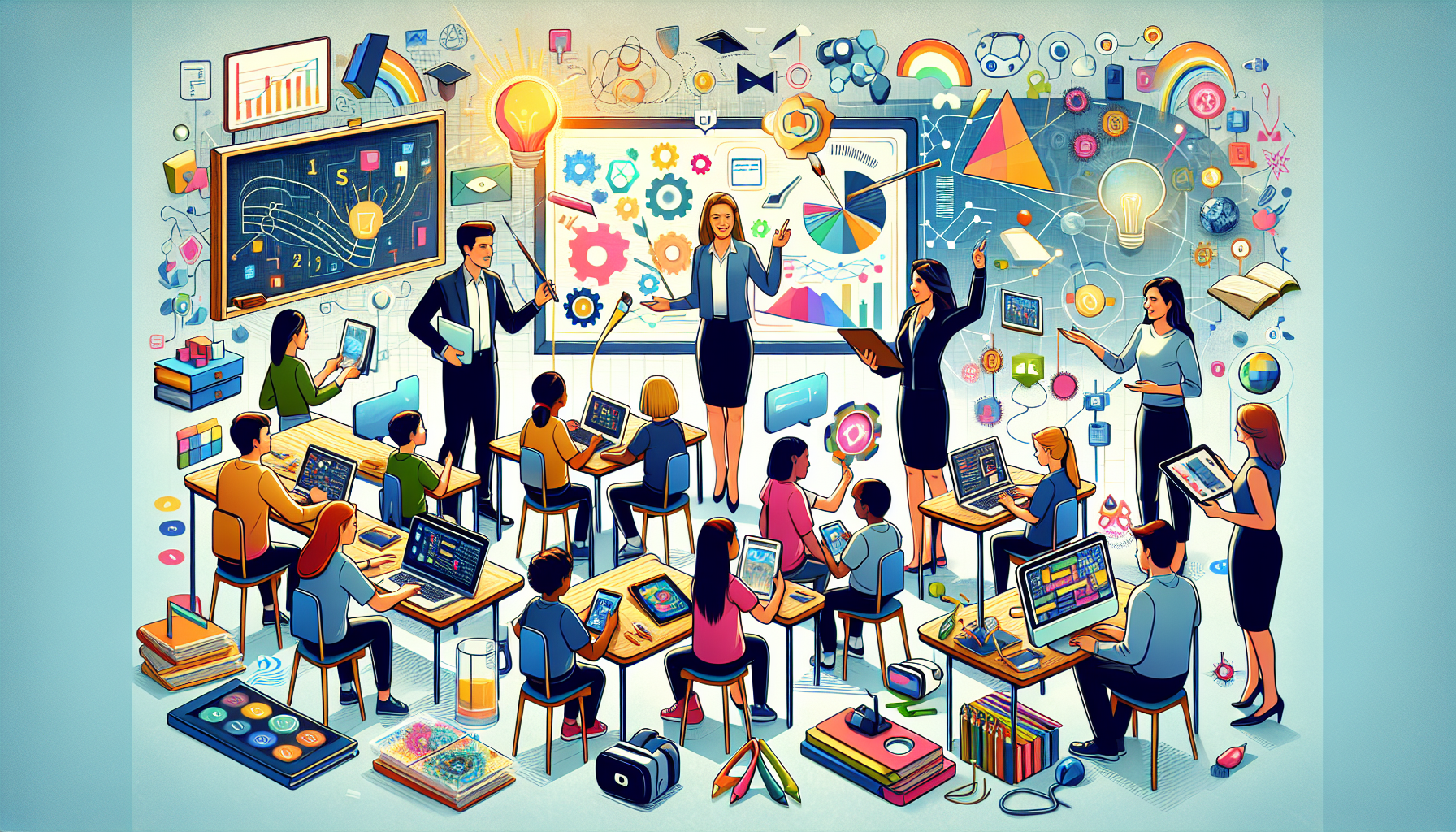
Implementing EdTech solutions in schools requires careful planning and consideration. Key steps include assessing educational needs, providing training and support for teachers, and ensuring data security. Each of these steps is crucial for the successful integration of technology into the educational environment.
Budget considerations, timelines, and ongoing support are crucial elements when selecting an EdTech provider. Custom educational software allows for modifications that adapt to changing educational trends, ensuring tools remain relevant and effective.
Assessing Educational Needs
Understanding user needs is crucial for creating effective EdTech solutions. Engaging with stakeholders to understand their needs is a key aspect of project initiation, achievable through surveys, focus groups, and feasibility studies.
Establishing a well-defined project timeline with resource allocation is critical for implementing EdTech solutions. Developing a system that meets unique priorities and aligns with institutional processes ensures its effectiveness.
Training and Support for Teachers
Teacher proficiency with new EdTech tools is crucial for successful implementation. Understanding proficiency levels helps identify the skills needed for effective tool use. Training sessions should be diverse and accessible, accommodating different user schedules and needs. This ensures all teachers, regardless of initial skill level, can effectively integrate EdTech into their teaching methods.
Providing go-live technical support once a school management system is launched is also essential. Ongoing support helps teachers continuously improve their use of technology, addressing challenges and ensuring tools are used to their full potential.
Ensuring Data Security
Protecting student data in digital learning environments is crucial. This issue is a critical concern for educators and institutions. Developers must implement strict security measures. This is crucial to protect sensitive information in educational environments. Monitoring system performance continuously after deploying a school management system ensures data security and efficiency.
Data protection involves implementing strong security measures, such as encryption and access controls, to prevent unauthorized access and breaches. Ensuring data security protects students and also builds trust in the use of EdTech solutions.
Future Trends in EdTech
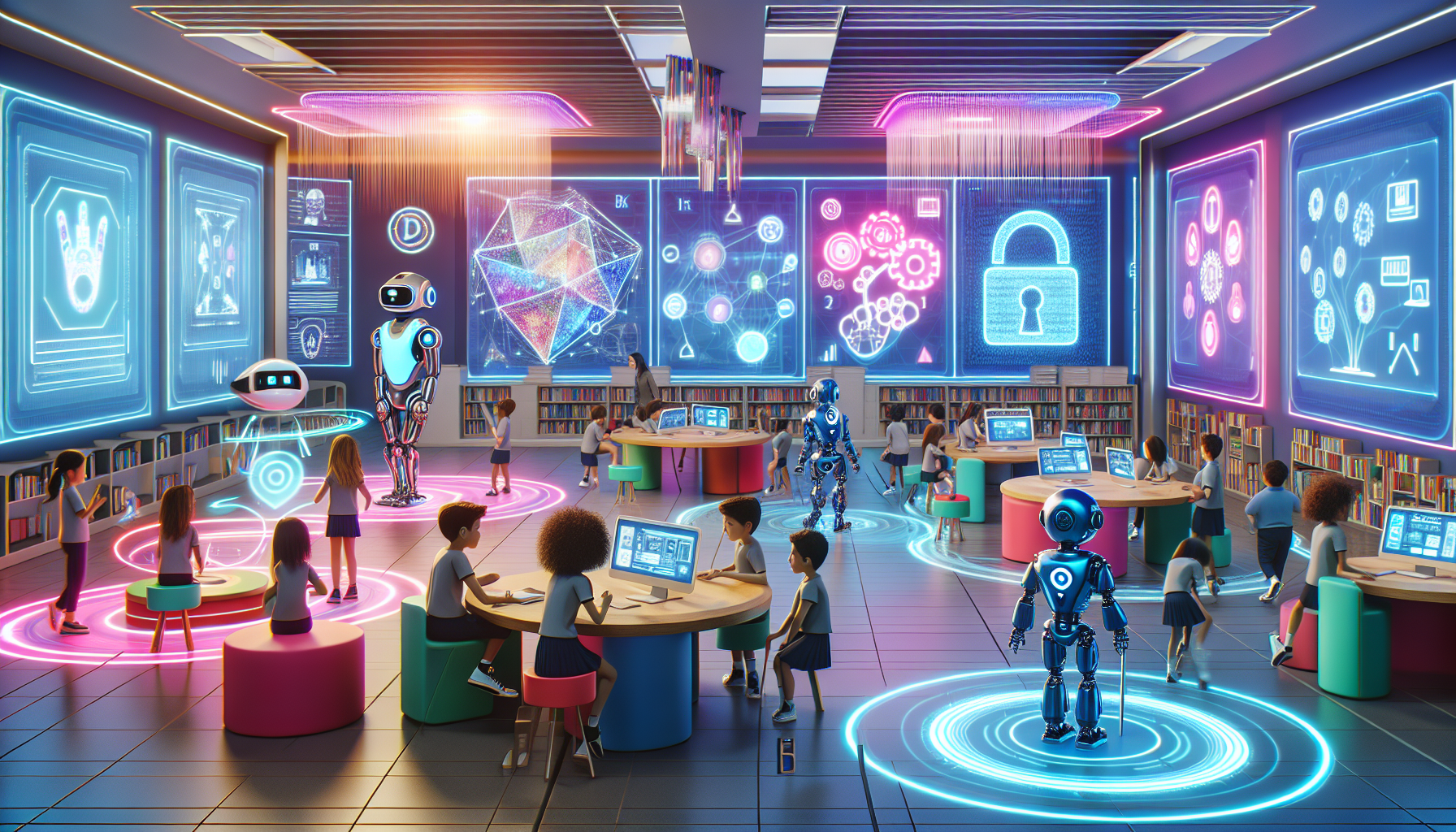
The future of EdTech looks promising with several emerging trends set to revolutionize the educational landscape. These include the integration of artificial intelligence (AI), the use of blockchain for educational credentials, and the rise of microlearning for adult learners. Each of these trends offers unique opportunities to enhance learning experiences and streamline educational processes.
Ongoing innovation in educational technology suggests a bright future for learners and educators alike. With the global market for educational technology expected to grow significantly, the possibilities for new and improved learning methods are endless.
Artificial Intelligence (AI) Integration
AI is increasingly used to personalize learning experiences for students. AI tools, especially in online K-12 schools, enable adaptive learning by adjusting content difficulty based on student performance. This allows for a more tailored and effective learning experience.
In the future, AI may further automate administrative processes, allowing educators to focus more on teaching. The integration of AI in education holds the potential to transform how we approach teaching and learning, making it more efficient and personalized.
Blockchain for Educational Credentials
Blockchain technology offers a transformative solution for managing and verifying educational credentials. By providing a decentralized system, blockchain can simplify the process of issuing and verifying degrees and certificates, making it more efficient and trustworthy.
The use of blockchain ensures a secure, transparent, and easy-to-verify method for educational institutions to manage credentials. This technology can significantly enhance the credibility and reliability of educational records.
Microlearning for Adult Learners
Microlearning, which involves delivering information in bite-sized lessons, is particularly beneficial for adult learners. This approach caters to the needs of busy professionals who require flexibility in their learning schedules.
By breaking down complex information into manageable chunks, microlearning ensures that learners can absorb and retain knowledge more effectively. This trend is set to continue growing as more adults seek to upskill and reskill in a rapidly changing job market.
Case Studies of Successful EdTech Implementation
Successful implementation of EdTech solutions requires ongoing support to address challenges that may arise during operation. Education software development companies play a crucial role in providing this support, helping institutions manage their EdTech tools effectively.
We will examine two case studies: the digital transformation of a university through the implementation of an LMS, and the growth of an online K-12 school using AI-driven tools. These examples illustrate the tangible benefits of EdTech when implemented correctly.
University Digital Transformation
A university implemented a Learning Management System (LMS) as part of its digital transformation efforts. The LMS provided features such as interactive learning, real-time feedback, and seamless communication, which significantly enhanced student engagement and performance.
The implementation of the LMS led to increased student satisfaction and academic success, showcasing the potential of educational technology to transform higher education. This case study highlights the importance of selecting the right EdTech solutions to meet institutional needs.
Online K-12 School Growth
An online K-12 school adopted AI-driven tools to enhance educational experiences. These tools led to improved academic performance and higher satisfaction rates among students, demonstrating the effectiveness of AI in personalized learning.
The specific AI-driven EdTech tools used by the school provided tailored learning experiences that catered to individual student needs, further highlighting the benefits of technology in education. This case study underscores the potential for EdTech to revolutionize K-12 education.
Choosing the Right EdTech Solution Provider
Selecting the right EdTech solution provider is crucial for successful implementation and ongoing support. Key considerations include evaluating the provider’s experience and expertise, the ability to customize and offer flexible solutions, and the incorporation of user feedback for continuous improvement.
Providers with a strong track record in educational software development are better equipped to create effective solutions that enhance learning and streamline administrative tasks. By choosing the right provider, educational institutions can ensure that their EdTech solutions meet specific needs and provide long-term value.
Evaluating Experience and Expertise
When selecting an EdTech solution provider, it is essential to consider their experience and expertise. Providers with a proven track record in educational software development are more likely to deliver reliable and innovative solutions. For instance, tech entrepreneur Konst, with decades of experience in software development, exemplifies the kind of expertise that can ensure effective implementation.
Choosing a provider with extensive expertise helps create solutions that enhance learning and streamline administrative tasks, supporting the institution’s educational goals. Evaluating the provider’s past projects and customer feedback can provide valuable insights into their capabilities.
Customization and Flexibility
Customization is a key advantage in educational software solutions, allowing institutions to address specific challenges and needs. Flexible solutions can adapt to changing educational trends and requirements, ensuring long-term relevance and effectiveness.
Providers that offer customizable solutions can tailor resources to fit the unique requirements of each educational institution, enhancing the overall learning experience. This flexibility is crucial for adapting to the evolving landscape of education and technology.
User Feedback and Continuous Improvement
Incorporating user feedback is vital for enhancing the functionality of educational software. By listening to the needs and suggestions of users, developers can continuously improve their solutions, ensuring they meet the evolving requirements of learners and educators.
Regular updates and iterative development based on user feedback lead to software that is more effective and user-friendly. This approach ensures that the EdTech solutions remain relevant and beneficial, providing ongoing value to the educational community.
Summary
In summary, EdTech solutions offer numerous benefits, including improved student engagement, personalized learning experiences, and streamlined administrative tasks. Effective EdTech tools feature interactive learning materials, seamless communication, and robust data analytics. Popular solutions like LMS, VR/AR, and mobile learning apps are transforming education at all levels.
As we look to the future, trends like AI integration, blockchain for educational credentials, and microlearning for adult learners promise to further revolutionize the educational landscape. By choosing the right EdTech solution provider and implementing these technologies effectively, educational institutions can enhance learning experiences and achieve their educational goals.
Frequently Asked Questions
How does EdTech improve student engagement?
EdTech enhances student engagement through the use of interactive materials, gamification, and immersive technologies such as AR and VR, making the learning experience more enjoyable and stimulating. Therefore, leveraging these tools can significantly boost student interest and participation in their education.
What are the benefits of personalized learning experiences?
Personalized learning experiences significantly enhance engagement and improve performance by catering to individual student needs. This approach also allows each learner to progress at their own pace, fostering better outcomes.
How can EdTech streamline administrative tasks?
EdTech streamlines administrative tasks by automating routine processes, which alleviates educators’ workloads and enables them to dedicate more time to teaching and supporting students effectively.
What are some key features of effective EdTech solutions?
Effective EdTech solutions should include interactive learning materials, seamless communication tools, and data analytics to track and enhance student performance. These features ensure an engaging and measurable learning experience.
How do you choose the right EdTech solution provider?
Choose the right EdTech solution provider by evaluating their experience and expertise, seeking customizable and flexible solutions, and ensuring they actively incorporate user feedback for ongoing improvement. This approach will help ensure you select a provider that meets your specific educational needs effectively.
About InTech Ideas
If you’re looking to elevate your tech strategy and drive business growth, InTech Ideas is here to help. We offer a comprehensive suite of services, including Software Development Teams, Product Development Fast Track, and Product Leadership & Advisory. Whether you need to scale your development team, fast-track your product, or bring in expert leadership, we provide tailored, people-first solutions that align with your company’s goals. Learn more about how we can support your journey by exploring our services or contacting us today to discuss your specific needs.

